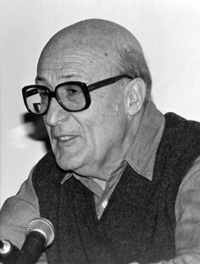
Will Eisner passed away on Jan. 3, after complications from a quadruple bypass heart operation. He was 87.
Most of you haven't heard of him, which is a bit of the sad part of all this.
Will Eisner was, as Alan Moore put it, "the single person most responsible for giving comics its brains."
He is often called the father of the American graphic novel, for his A Contract with God, published in 1978. I'm not exactly sure if he is (there have been works/creators vying for the title recently), but it doesn't really matter. Eisner is the man who unapologetically, unabashedly saw the potential in comics as an art form, a medium, a way to tell stories. He always treated it with respect, as a valid form of literature, even when everyone else around him sneered or made light of his efforts, sometimes even his peers and co-workers. He started his own studio of artists, giving people like Jack Kirby and Jules Feiffer their first jobs. He was one of the first people to really examine the form and craft, why this works and that doesn't and what this change will result in, and he put this knowledge to use as a teacher and in his essential books of instruction that he published himself under his imprint Poorhouse Press. He is the man who always believed that comics wasn't JUST for children, and didn't ALL have to be about superheroes. He's the man who gave the world The Spirit, which was published weekly in major newspapers, a strip aimed at adults with mature themes and bravura invention in storytelling. He's the guy who, unlike most of his contemporaries (like Bob Kane), adamantly refused to sign away the rights to his creations, a pioneer for creators' rights before there was any widespread knowledge in the industry that it was even an issue. He's the man who stopped the lucrative Spirit series to go do his part in the War, where he used his knowledge to make instructional and technical manuals for engineers in the infantry. He is the man the comics industry's equivalent of the Oscars-- the Eisner Awards-- are named after (and he's handed each award to its winner since the beginning). Perhaps most amazingly, he is the gentleman who never became a cynic through all the decades comics has seen, who was supportive of all endeavors and especially loved it when young people took an interest in making their own comics.
When he died, he wasn't just "continuing to work in the medium he so loved," he was an engine of creation. He was damn prolific for an 87-year-old. He had a graphic novel come out last year, Fagin the Jew (a biography of the character from Oliver Twist), he has a book of conversations between him and Frank Miller entitled simply Eisner/Miller coming out in April, and he had just completed what will now be his final book, to be published posthumously (obviously), entitled The Plot. In between all that he was making appearances at conventions and speaking/lecturing at universities and conferences.
He was an inspiration to most everyone he met, and millions more he didn't. At the least, he has entertained many more millions of readers through his works.
He will be missed by us all. The world is a poorer place without him. But he left it a better place than he found it, and his contributions to this world will far outlive anything we will make. In fact, the debt we owe him-- not just us fans, but the medium, the industry, and everything he has influenced-- can never truly be repaid. And you know what? He never meant for it to be a debt in the first place. He always gave freely of himself, because he loved and believed in the medium, the fans, the industry.
That's just the kind of guy he was.
WORKS:
DC have The Will Eisner Library, which includes The Spirit Archives.
Dark Horse have a sketchbook, Last Day in Vietnam, Shop Talk, Hawks of the Sea, and the forthcoming Eisner/Miller. They'll also publish his official biography in the summer, called "A Spirited Life."
NBM have his adaptations.
Fagin the Jew was published by Doubleday. The Plot will be published by WW Norton later this year.
His seminal books of instruction: Comics & Sequential Art, and Graphic Storytelling, published by Poorhouse Press, should be available in any good bookstore (I know they're in both Powerbooks and Fully Booked).
No comments:
Post a Comment